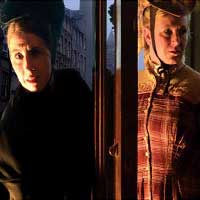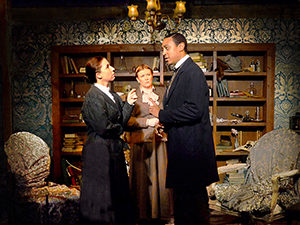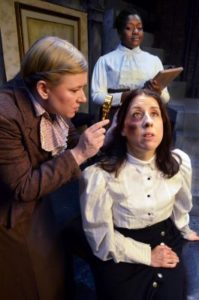
 [rating=4] Sherlock Holmes is generally acknowledged as having produced the first and longest continuously active fandom, and with Sir Arthur Conan Doyle’s copyright on the character (though not all of his stories) having expired, playwrights are now free to invent their own stories about the famous detective as they please. Varying interpretations of the character grace stages of all sorts quite frequently, but in the new play by Christopher M. Walsh debuting as Lifeline Theatre, Walsh utilizes one of the most common experiments among fans positing alternate universes for their favorite characters, and changes the key characters’ genders. Miss Holmes is therefore largely concerned with Victorian patriarchal oppression, but Walsh has concocted an exciting mystery to accompany it, and under the direction of Paul S. Holmquist, the play has all the charm and fun of any Sherlock Holmes story, but with a very dark atmosphere that cannot be dismissed as mere fantasy.
[rating=4] Sherlock Holmes is generally acknowledged as having produced the first and longest continuously active fandom, and with Sir Arthur Conan Doyle’s copyright on the character (though not all of his stories) having expired, playwrights are now free to invent their own stories about the famous detective as they please. Varying interpretations of the character grace stages of all sorts quite frequently, but in the new play by Christopher M. Walsh debuting as Lifeline Theatre, Walsh utilizes one of the most common experiments among fans positing alternate universes for their favorite characters, and changes the key characters’ genders. Miss Holmes is therefore largely concerned with Victorian patriarchal oppression, but Walsh has concocted an exciting mystery to accompany it, and under the direction of Paul S. Holmquist, the play has all the charm and fun of any Sherlock Holmes story, but with a very dark atmosphere that cannot be dismissed as mere fantasy.
The story begins with Lizzie Chapman (Kate Nawrocki) concealing a threatening letter she has received. Her husband, police detective Thomas Chapman (John Henry Roberts) is frequently in the news for allegations of brutality and corruption, and he is not at all pleased to find one of his many critics attempting to interfere in his home life. But the letter is not a threat to Lizzie, but a warning: Thomas’s previous two wives died in highly suspicious circumstances. When London women find themselves in need of a sympathetic agent to help them solve unusual problems, they go to the famous Sherlock Holmes (Katie McLean Hainsworth), and that’s to whom Lizzie goes to find out who wrote her the letter.
Meanwhile, Dr. Dorothy Watson (Mandy Walsh) is one of the very first women to practice medicine in England, and laments how frequently women’s health is ruined by oppressive social constraints. A patient has just died after waiting too long to seek help for an infection because the sick woman feared what her husband would do to her if she was not at home when he expected her to be. Watson first meets Sherlock after she has been released from a mental institution under the recognizance of Sherlock’s brother, Mycroft (Chris Hainsworth), where she had been confined for unladylike behavior. Sherlock and Mycroft agree that Dr. Watson would be a good influence on Sherlock—someone who can tell her when her violation of social norms is about to get her in deep trouble—and Mycroft also expects that Watson will put an end to Sherlock’s investigations. But after getting drawn into the Chapman case, Watson realizes that working with Sherlock could be exactly the way of helping women she’s been searching for.
One of the pleasures of gender-swapping Sherlock is having to opportunity to see what actresses do with the iconic roles. Katie McLean Hainsworth is recognizably the Conan Doyle character, possessing a nearly unflappable demeanor, low-key but ever-present quirkiness suggesting an unusual neurological make-up, and a penchant for sarcasm. Walsh makes the Dr. Watson character a compelling everywoman, with a very strong sense of morality and personal drive, but a natural tendency to work within systems rather than outside of them. She and Sherlock are truly symbiotic, and the evolution of their relationship is the heart of the script. Seven other actors play a variety of supporting characters, and in each case they modulate their voices and physicality enough to be distinctive and memorable. The nature of the story allows some slight exaggeration, which is useful for distinguishing between characters and helps keep things from getting too grim. Abie Irabor in particular completely re-invents herself several times.
Assisting in the creation of the Victorian London underworld are the rich and elaborate visuals Holmquist’s design team have produced. The set by Ashley Ann Woods and the props by Holly McCauley create a sinister, shadowy world full of danger, and the lighting design by Jordan Kardasz helps establish the creepiness of some key moments. Holmquist also keeps a complicated story moving at just the right pace so that we are able to understand all the key information and eagerly anticipate seeing what will happen next. Walsh’s script carefully balances the need to establish the female characters’ place in the world with the particulars of the mystery, and he is able to connect the themes of sexist oppression with the case quite smoothly. Of course, this being a Sherlock Holmes story, the truth of the case is quite a bit more complicated than any easy, pat didactic. For the many fans of the great detective, Miss Holmes is a true delight—expanding and commenting upon the original, while adding its own twist.
“Miss Holmes” will continue at Lifeline Theatre, 6912 N Glenwood Ave thru October 30. Running time is two hours and fifteen minutes with one intermission. Free parking is available.
Performances are as follows:
Fridays at 7:30 pm
Saturdays at 4:00 pm and 8:00 pm
Sundays at 4:00 pm
Ticket prices are $40, with discounts for military personnel, seniors, students, groups, and rush orders. To order, call 773-761-4477 or visit lifelinetheatre.com.
To see what others are saying, visit www.theatreinchicago.com, go to Review Round-Up and click at “Miss Homes”.







More Stories
“The S Paradox” reviewed by Julia W. Rath
“A Year With Frog and Toad”
” Monsieur Chopin” a play with music